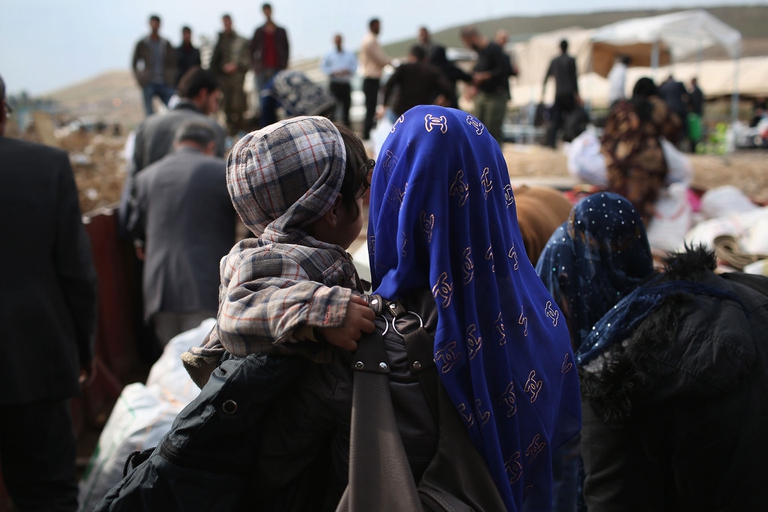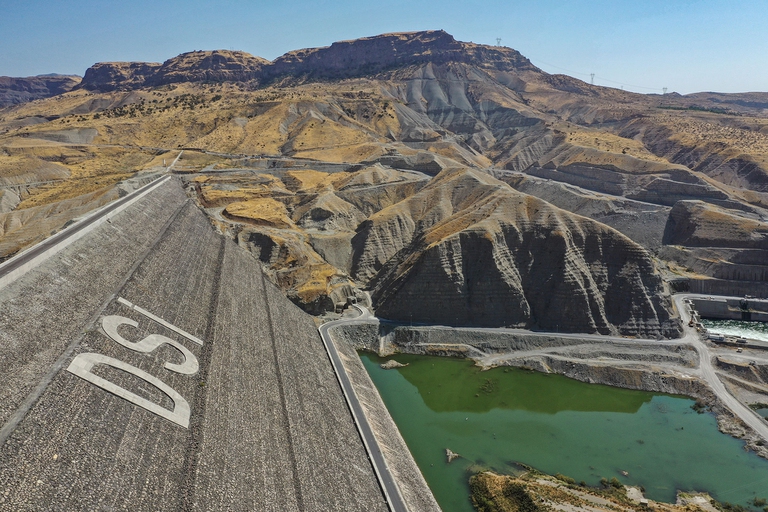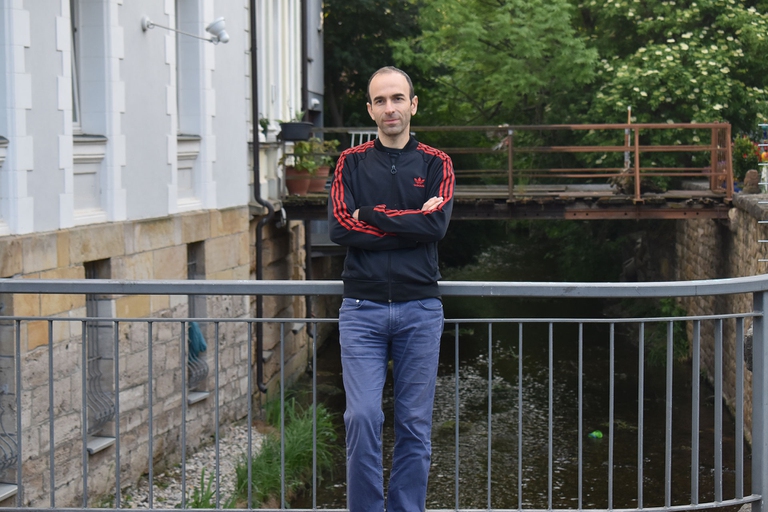
A report by Ember explains that in 2025 electricity generation from renewables (solar, wind and hydropower) surpassed that from fossil fuel sources.
Committed to the struggle for the right to water, in Hasankeyf and in the Syrian region of Rojava. This is the story of water defender Ercan Ayboga.
by Christian Elia
“I grew up in an industrial city in Germany, in our small, working-class apartment. Nature was a faraway thing for me when I was small, and water was just something to drink and use. During my school years, no one ever asked us to reflect on the importance of water. Every time that, during the summer holidays, I returned with my family to their home town of Dersim, in northern Kurdistan – which today is known as Turkish Kurdistan – I discovered more about the relationship between the city and its river, the Munzur. It was clean, free, the place we went for family picnics, where we would go swimming. It ran deep and clear through the mountains before reaching the city of Dersim. Year after year, I gained a growing awareness of how important that river was to the community. And how important it was to defend it”.
Ercan Ayboga is an environmental engineer and activist who, while still in Germany, co-founded Tatort Kurdistan. He spends his time between Northern Kurdistan and Germany, the country in which he was born to Kurdish parents who arrived from Turkey. Ayboga is involved in the Mesopotamian Ecology Movement and, in particular, in the fight for the right to water. He worked firsthand on defending the Hasankeyf archaeological site and the Kurdish families displaced by the Turkish government’s Ilisu Dam project, and for fair access to water resources in Rojava, in Syrian Kurdistan.
“In Kurdish culture, communities have a solid relationship with their land’s natural resources. Mountains and rivers are part of the collective identity. Agriculture still mostly follows rainfall cycles so as not to impact rivers, and water is part of the planning of daily life, it’s treated with respect and used with care. As in many other ancient cultures, the Kurds also have myths and legends linked to water and to their traditions. Water has a symbolic meaning: it quenches thirst, purifies, cleanses the body and the soul. Where we are there are also Alevite communities, who are also oppressed by Turkey’s central government, and water has a mystical significance for them too. After my studies, I focused primarily on the protection of rivers, having been influenced and stimulated by this cultural heritage”.
Hasankeyf, effectively, no longer exists. Turkey itself once called it a “jewel of humanity” and designated it as a protected area. UNESCO was set to include in its list of heritage sites requiring protection. Now, it has disappeared from view, definitively and completely, submerged by the expansion of the Ilisu Dam on the Tigris River. It was a city with a 12,000-year-long history. The water also engulfed some 200 Kurdish villages, and tens of thousands of people had to leave the land – which the Kurds call Bakur – where their community had lived for millennia, though it’s now administered by Turkey. The dam’s impacts also extend downriver, with the quality of life in the marshlands of Southern Iraq, further along the Tigris, suffering greatly. This environmental catastrophe has hit a region that had already been suffering greatly due to climate change and drought. Ercan Ayboga was at the forefront of an international battle against this destruction. Even though it ended in defeat, the consequences – for him and many others – were far-reaching.
“Thanks to the fight for Hasenkeyf, the local community, Kurdish people more generally, even public opinion in Turkey, Iraq, and the rest of the world strengthened their awareness of the safeguarding of natural resources, of cultural heritage, and of water in particular,” Ercan explains. “It became a symbol and led millions of people to ask themselves a key question: can a profit motive that destroys history, land, and communities really be called “development”? Hasenkeyf is a warning: everyone must defend natural resources before it’s too late. A new environmentalist movement was born and became stronger, in Turkey and Iraq, thanks to all the work that went into the campaign. This gave life to the Mesopotamian Ecology Movement. And thus, instead of being an end-point, that battle became a starting point for a movement, even though we weren’t able to stop the project. Since the beginning, we didn’t know how to stop them, but we knew that we had to oppose the project, focusing on producing documents to give tools to local communities, rather than putting pressure on the companies involved. Maybe in the future, thanks to all this, we will be able to restore the site”.
Ercan, whose popular blog contains many of his writings about Rojava and the conflict in Syria, has also written a book on the model of community management of the right to water being experimented by Kurdish communities in Syria. Here, as in many other places around the world, control over water has become a weapon of war.
“Water has been a weapon in warfare for at least thirty years. It’s used to control territories and for private interests. Turkey’s aggressive policy towards its neighbours, Syria and Iraq included, happens through its control over water resources. It’s no coincidence that the Turkish government has linked the flow of water it allows into Iraq to the possibility to bomb Iraqi Kurdistan with impunity. In Rojava, after ISIS was driven out, local communities organised, from the bottom up, so that everyone had access to water. Municipal councils, for a symbolic fee, distribute resources based on necessity, and no one would dream of cutting off water to those who have difficulties paying. People here are working on developing a sustainable farming model, without the need for huge artificial irrigation projects. Balanced reforestation is underway, and families are being educated on reasonable electricity use. Better to share the little we have than to be at risk of blackmail.
“For years, Turkey ramped up the pressure, targeting wells and shutting off water supplies. This summer is dire: it hasn’t rained since April in the region. One of the worst droughts since 2008. Without a community approach, no one would be happy. What’s being trialled in Rojava is a model that we should all care about, wherever we live, because the crisis that climate change puts in front of us can only be faced if we change certain social and cultural approaches.
“And finally, precisely because water is a weapon of war, the cross-border work that we have started in the region – culminating in the two editions of the Mesopotamian Water Forum – starts from the idea that water and rivers teach us that there are no national, political, or geographical boundaries to separate us in the face of drought and thirst. Today, Kurdish, Turkish, Iraqi, Lebanese, and Jordanian people, and many others, are working together, sharing activism practices and documents. This is much more important than this or that government because it brings people together, to focus on water, change their lives, and protect their communities”.
Water Defenders is a Water Grabbing Observatory project celebrating the tenth anniversary of the recognition of the human right to water through a series of interviews that tell the stories of grassroots battles being fought for water all over the world. A multi-faceted struggle against resource exploitation and large as well as small projects that impact communities and natural environments. Ordinary yet extraordinary men and women across the world are defending this fundamental human right. Starting from World Water Day, 22 March, LifeGate regularly publishes features by the Water Grabbing Observatory, each centred on a person fighting to protect the most precious resource we have. And claim their right to water.
Siamo anche su WhatsApp. Segui il canale ufficiale LifeGate per restare aggiornata, aggiornato sulle ultime notizie e sulle nostre attività.
![]()
Quest'opera è distribuita con Licenza Creative Commons Attribuzione - Non commerciale - Non opere derivate 4.0 Internazionale.
A report by Ember explains that in 2025 electricity generation from renewables (solar, wind and hydropower) surpassed that from fossil fuel sources.
The Tyler Prize, considered the “Nobel Prize for the Environment,” has been awarded to Toby Kiers, an American biologist working in Amsterdam.
Belgium is one of the countries most exposed to climate change. Dune–dikes are a solution to curb sea-level rise.
Between October 2024 and September 2025, the average temperature in the Arctic was 1.6 degrees Celsius higher than during the 1991–2020 period.
Undeclared conflicts of interest, paid authors, lack of transparency: one of the most cited studies on glyphosate, published in 2000, has been retracted.
The Copernicus service has released data for the first eleven months of 2025: global warming is set to come close to last year’s record.
The European Council and Parliament have reached an agreement on the European Commission’s proposal to deregulate new GMOs. But farming, organic agriculture, and environmental organizations are calling for it to be stopped.
The world’s second-largest producer has taken a historic decision. However, farms will have until 2034 to shut down.
A Greenpeace report denounces Russia’s political and economic model: a nexus of extractivism, authoritarianism and war that is destroying the environment, with serious repercussions for the global ecosystem.










